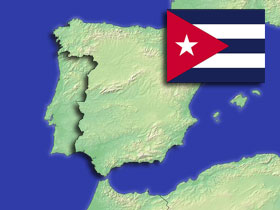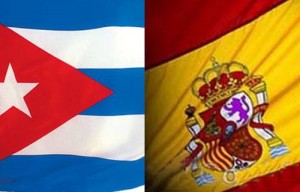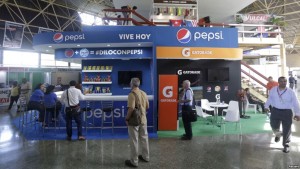SPAIN “HIT THE ACCELERATOR” TO STRENGTHEN INTERESTS IN CUBA.
Spain wants to consolidate its position of advantage in Cuba at a time when the major economies of North America, Asia, the EU and Latin America itself give concrete steps and hurried to enter the island and raise their economic links and investors. Spain hit the accelerator to ensure its traditional position of privilege in the country, reinforced during the years of US blockade. It seems as if his life depended on it.
While Madrid announced the restructuring of Cuban debt, extensive political and business representation moved to the country to participate in the most important annual trade event on the island, the FIHAV 2015, opened Tuesday with the presence of 600 companies more than 70 nations, of which over 160 Spanish firms.
On Monday, before the start of the 33rd edition of the International Fair of Havana, authentic Cuban showcase to seduce foreign investors, ministers of Economy, Luis de Guindos and Industry, Energy and Tourism, José Manuel Soria, who accompanied the large Spanish business delegation to boost an already privileged economic and investment relationship, made it clear interest in the island with the signing of important agreements. The FIHAV, founded in 1983, is the largest multi-sector trade fair in Cuba and the Caribbean. In 2014 it focused on investment promotion.
De Guindos used his visit to initial an agreement to refinance short-term debt that Cuba has with Spain, 201.5 million euros (222 million dollars). It is a new gesture toward Cuba in Madrid change after the thaw in relations with the US. These are defaults that Cuba has with Spain since 2000 and include principal and interest on late payments.
In addition, De Guindos and Soria initialed cooperation agreements in trade and investment relations in R + D + I in order to take advantage of new opportunities for Spanish companies open on the island.
These agreements are a Memorandum of Understanding on Economic Cooperation to provide an efficient institutional framework and identify priority areas for collaboration. And in I + D + i, an agreement with the Spanish CDTI for five years that will benefit companies in sectors such as food, biotechnology, electronics, logistics and chemical.
The cooperation pact provides for the creation of a Working Group on Trade and Investment which aims to provide an institutional framework for deepening relations. Other agreements establish joint projects in industrial cooperation and development of SMEs, increased energy security and promote renewable.
PRESENCE OF SPAIN.
Spain is the country most represented at the fair, which involved among other firms Meliá, Iberostar, Sabadell, Habanos, Aguas de la Habana, Hotelsa, Iberia, Deloitte and boast as well as a delegation of CEOE. They are present also the CEO of ICEX, Francisco Garzón, President of COFIDES, Salvador Marin and Cesce President Alvaro Bustamante.
Companies like Seat and Roca have confirmed they have received an official letter from the Government of Cuba with an invitation to its implementation in the country, while the tourism sector firms and Balearia Hotusa negotiate with Havana and Iberia has resumed its flights a few months ago. The official ICEX pavilion at the fair, in which 80 companies from various sectors are present with a Basque flag adds 36 companies and more than 40 other Spanish exhibitors spread across the rest of pavilions.
Spain is the third largest trading partner and the largest investor in Cuba, a country in which more than 200 companies with an annual trade of 1,000 million euros operating. The Spanish business presence stands in the tourism sector, second income country (Meliá, Barceló, NH …) and where Spain is leading with more than 60 hotels and manage almost 95% of the beds.
Exports from Spain to the island have grown in January-August of 2015 by 40%, to 598 million. In the country they are in a much signatures as Altadis, Bodegas Torres, Froxá and Argal. According to ICEX, Cuba is the fifth Latin American market for Spain, after Mexico, Brazil, Argentina and Chile.
Cuba Spain offers investment especially in tourism, renewable, infrastructure, pharmaceutical and agri-food, to heave the new Foreign Investment Law, approved last March. There are also possibilities in audiovisual: Cuba currently working on a new film law to capture the interest of forward foreign producers filming in Cuba or invest in areas of the audiovisual system.
Competition in sight.
But Spain is not the only country that is quick to Cuba. USA, China, Japan, Russia, Mexico, Canada, Germany, Peru and other countries try to endless inroads on the island hove normalization with Washington.
Agencies / CApitalMadrid, Spain / Excerpts / Carlos Alvaro / InternetPhotos.
The Cuban History, Hollywood.
Arnoldo Varona, Editor.
ESPAÑA “PISA EL ACELERADOR” PARA AFIANZAR INTERESES EN CUBA.
España quiere consolidar su posición de ventaja en Cuba en un momento en el que las grandes economías de Norteamérica, Asia, la UE y la propia Latinoamérica dan pasos concretos y apresurados para entrar en la isla o elevar sus vínculos económicos e inversores. España pisa el acelerador para asegurarse su tradicional posición de privilegio en el país, reforzada durante los años del bloqueo norteamericano. Parece como si se le fuera la vida en ello.
Al mismo tiempo que Madrid anunciaba la reestructuración de la deuda cubana, una amplia representación política y empresarial se desplazaba al país para participar en la cita comercial anual más importante de la Isla, la Fihav 2015, abierta este martes con la presencia de 600 empresas de más de 70 naciones, de ellas más de 160 firmas españolas.
Este lunes, antes de que comenzara la 33 edición de la Feria Internacional La Habana, auténtico escaparate cubano para seducir a los inversores foráneos, los ministros de Economía, Luis de Guindos y de Industria, Turismo y Energía, José Manuel Soria, que acompañaron a la amplia delegación empresarial española para impulsar una relación económica e inversora ya privilegiada, dejaron patente el interés por la Isla con la firma de importantes acuerdos. La Fihav, surgida en 1983, es la feria comercial multisectorial más importante de Cuba y el Caribe. En 2014 estuvo centrada en la promoción de inversiones.
De Guindos aprovechó su visita para rubricar un acuerdo de refinanciación de la deuda a corto que la Isla mantiene con España, 201,5 millones de euros (222 millones de dólares). Se trata de un nuevo gesto de Madrid hacia una Cuba en cambio tras el deshielo en sus relaciones con EEUU. Se trata de impagos que Cuba mantiene con España desde el 2000 e incluyen principal e intereses de demora.
Además, De Guindos y Soria rubricaron acuerdos de colaboración en relaciones comerciales y de inversión en I+D+I con el objetivo de aprovechar las nuevas oportunidades que para las empresas españolas se abren en la isla.
Entre estos acuerdos están un Memorando de Entendimiento sobre Cooperación Económica para proporcionar un marco institucional eficiente e identificar sectores prioritarios de colaboración. Y, en I+D+i, un convenio con el CDTI español por cinco años que beneficiará a empresas de sectores como el agroalimentario, biotecnológico, electrónico, logístico y químico.
El pacto en cooperación establece la creación de un Grupo de Trabajo sobre Comercio e Inversión cuya meta es proporcionar un marco institucional para profundizar en las relaciones. Otros acuerdos fijan proyectos conjuntos en cooperación industrial y desarrollo de pymes, aumento de la seguridad energética y fomento de las renovables.
PRESENCIA DE ESPAÑA.
España es el país más representado en la Feria, en la que participan entre otras firmas Meliá, Iberostar, Sabadell, Habanos, Aguas de la Habana, Hotelsa, Iberia, Deloitte y Alarde, así como una delegación de CEOE. Están presentes, asimismo, el consejero delegado del ICEX, Francisco Garzón, el presidente de Cofides, Salvador Marín y el presidente de Cesce, Álvaro Bustamante.
Compañías como Seat y Roca han confirmado que han recibido carta oficial del Gobierno de Cuba con invitación a su implantación en el país, mientras que firmas del sector turístico como Hotusa y Balearia negocian con La Habana e Iberia ha reanudado hace pocos meses sus vuelos. Al pabellón oficial del ICEX en la feria, en el que están presentes 80 empresas de sectores diversos se suma un pabellón vasco con 36 empresas y hay más de otros 40 expositores españoles repartidos por el resto de pabellones.
España es el tercer socio comercial y el principal inversor en Cuba, país en el que operan más de 200 empresas con un intercambio comercial anual de 1.000 millones de euros. La presencia empresarial española sobresale en el sector turístico, segunda fuente de ingresos del país (Meliá, Barceló, NH…) y donde España es líder con más de 60 hoteles y la gestión de casi el 95% de las camas.
Las exportaciones de España a la isla han crecido en enero-agosto de 2015 un 40%, a 598 millones. En el país están desde hace mucho firmas como Altadis, Bodegas Torres, Froxá y Argal. Según el ICEX, Cuba es el quinto mercado latinoamericano para España, tras México, Brasil, Argentina y Chile.
Cuba ofrece especialmente a España inversiones en turismo, renovables, infraestructura, industria farmacéutica y agroalimentación, al pairo de la nueva Ley de Inversión Extranjera, aprobada el pasado marzo. También hay posibilidades en audiovisual: Cuba trabaja actualmente en una nueva Ley de cine para captar el interés de productores extranjeros con interés de filmar en Cuba o invertir en áreas del sistema audiovisual.
Competencia a la vista.
Pero España no es el único país que se apresura en Cuba. EEUU, China, Japón, Rusia, México, Canadá, Alemania, Perú y otro sinfín de países tratan de abrirse hueco en la Isla al pairo de la normalización con Washington.
Agencies/CApitalMadrid, Spain/Excerpts/Carlos Alvaro/InternetPhotos.
The Cuban History, Hollywood.
Arnoldo Varona, Editor.







